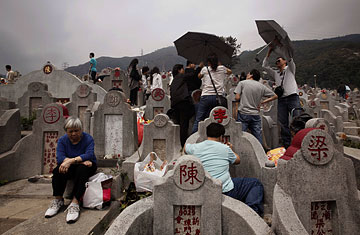
Worshippers pray at their families' graves at Diamond Hill Cemetery during the Chung Yeung Festival (Grave Sweeping Festival) in Hong Kong on April 4, 2009
In Hong Kong, it can be hard just finding somewhere to sit down. The fourth most densely populated place in the world, the city sees its park benches packed while strangers share restaurant tables. And for the 40,000 people who die there every year, it turns out there's no respite from the crowds either. While land shortages forced most Hong Kongers to abandon burials in the 1980s, now the city has run out of space even for cremated ashes. By some estimates, around 50,000 families are presently storing their relatives' remains in funeral homes while they wait, perhaps for years, to secure a one-square-foot wall niche in one of the city's public columbaria — buildings designed to house cremation urns.
Last month, the government began accepting applications for 18,500 new niches — the largest supply in almost a decade — at its nine-story Diamond Hill columbarium. Though applications could be mailed or faxed in, nearly 1,000 people queued in line to submit their paperwork in person on opening day. After graphic designer Raymond Wong's father passed away in December, Wong applied for a niche at another of the city's public columbaria, but was turned away after spaces filled up. "Hopefully this time I'll find a place for my father so he can finally rest," says Wong, while waiting in line at Diamond Hill with his mother. (See pictures of Hong Kong since it was handed over to China.)
Though the government plans to release 37,000 new niches by 2012, that supply will only meet the demand of a single year's cremations. By 2016, there will be no space in public or private columbaria for the remains of up to half of the people who die each year, according to government estimates. The construction of new columbaria is regularly mooted, but neighborhood resistance scuppers the plans. Residents worry that proximity to such buildings will bring them bad feng shui and lure large crowds during ancestral-worship festivals. "We Chinese call a place for the dead yum chaak, and a place for the living yeung chaak. They cannot be mixed," says Kenneth Leung, a funeral coordinator. "Nobody wants cemeteries or columbaria near their homes — yet everybody needs them."
For wealthy families, burial is still an option, but permanent plots are scarce and can cost upward of $30,000. For $3,000, temporary public plots can be rented for 10 years, after which the family can renew for another decade, or exhume the remains and yield the plot to someone else. Some residents have sent bodies abroad to bury, particularly in the U.S. and Canada, or looked across the border to China, but the journey to visit such graves can be taxing for older relatives. Jockeying for burial space in Hong Kong has become so intense that last year 18 cemetery supervisors were arrested for allegedly accepting bribes in order to exhume remains before they had fully decomposed. (See a map of population density in Chinese cities.)
The alternatives offered by the government have failed to take pressure off the system. There are sea scatterings and ash burials in public gardens, but longstanding tradition prevents most families from taking up these space-saving solutions. "My husband didn't say much," says Wong's 75-year-old mother, Oi Tak-lo. "But he did say that he didn't want a sea burial. The older generation won't agree with it."
Yet something has to give. Hong Kong's population of 7 million is aging fast. In 2008, 12% of the population was over the age of 65; by 2036, that number will rise to 26%. The city's death rate has doubled since 1970, leaving the entire funeral industry scrambling to cope with the rising demand. The government is installing more efficient cremators, but today bodies must be stored in morgues — often two to a compartment — for as long as two weeks before cremation can be completed.
For Oi, the wait is an unwelcome source of stress as she grieves the loss of her husband of 40 years. "I just want to get this over with so my heart can be at peace," she says. Sadly for Oi and thousands of other bereaved, that peace might be a long time coming.
